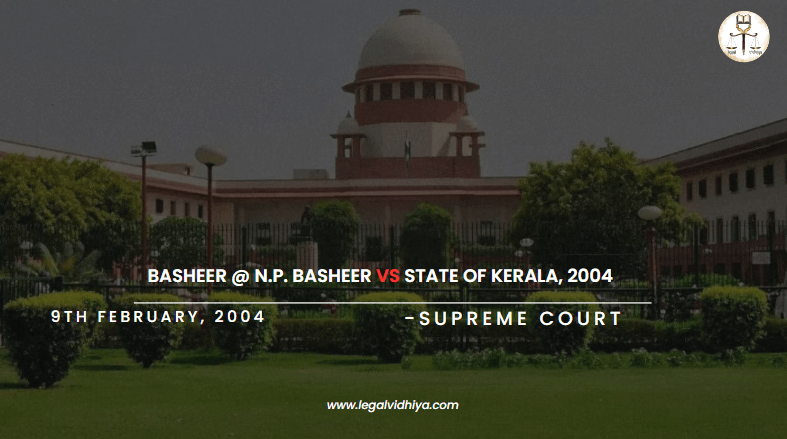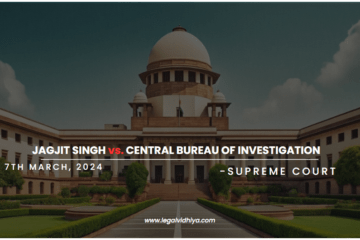
| CITATION | 2004 (3) SCC 609 |
| DATE OF JUDGEMENT | 9th February, 2004 |
| BENCH TYPE | Constitutional |
| COURT | Supreme Court of India |
| JURISDICTION TYPE | Criminal Appellate Jurisdiction |
| APPELLANT | Basheer @ N.P. Basheer |
| RESPONDENT | State of Kerala |
| BENCH | K.G. Balakrishnan, B.N. Srikrishna |
INTRODUCTION
Basheer @ N.P. Basheer Vs State of Kerala, 2004 is an important case held in the Hon’ble Supreme Court of India under the criminal appellate jurisdiction. It rechecked the constitutional validity of section 41(1) of NDPS Act which was amended thereafter. The Hon’ble bench provided a fair judgement whether the new amendment made in 41(1) of the act is leading to violation of Article-14 of Indian constitution or not. The case also rechecked the decision laid down by the accused’s respective high courts. The case involves appellant Basheer @ N.P. Basheer and respondent State of Kerala. This was a remarkable case decided in the year 2004.
FACTS OF THE CASE
The accused in this case were first convicted by the trial courts and had later filed their appeals before their respective high courts. The facts and arguments present in these cases were different and are used to decide on a particular major issue.
Their appeals were considered to be pending before high courts on 2nd October, 2001 when the new act 9 of 2001 came into existence. In these different cases, the accused were found guilty by their respective high courts for the offences mentioned under the NDPS Act and were also provided with 10 years of rigorous imprisonment with a one lakh INR fine which was the minimum punishment as prescribed under the NDPS Act but changes took place prior to the new amendment which came into force from 2nd October, 2001.
The NDPS Act, 1985 provides severe and strict punishment as evident under the minimum sentence mentioned under sections 21 and 22 of the act. It was found that in large number of cases, the accused had small amount of drugs and were actually drug addicts rather than drug traffickers and that’s the major reason for those people as they hardly obtain bail due to the stricter bail regulations.
Under section 27 of the act, it provides flexibility to the accused if they prove that the drugs they had is for their personal consumption and not for sale purpose. It somehow decreases the quantum of punishment.
But under the amending act 9 of 2001 which mentions about statements of objects and reasons, has concluded that that the stricter bail provisions mentioned under the act just adds to the accused’s misery. Therefore, a need of rationalization is necessary.
The new amending act has defined two terms and that are “commercial quantity” and “small quantity”. According to the new clause (viia) in section 2, it defines that any quantity which is considered to be greater than the official quantity as issued by central government on official gazette is known as commercial quantity and according to the clause (xxiiia), it defines that any quantity which is considered to be lesser than the official quantity as issued by central government is called small quantity.
The amending act also brought changes in the section 41(1) of the act which mentioned about application of this act to pending cases, it further included that any person who’s found guilty under this act before commencement of the new amending act shall be held liable for a punishment which is comparatively lesser than the punishment during commission of such offence but will not be held applicable to those cases which are pending in appeal.
The pending cases in appeal can’t get the benefit out of the act but cases like pending before the court on 2nd October 2001, cases under investigation as to date can get the benefit out of this new amending act.
ISSUE RAISED
- Whether the new amending act as proposed by the parliament is violative of article 14 of Indian constitution?
ARGUMENTS RAISED BY THE APPELLANT
- The learned counsel for the appellant has urged that a statute which is retrospective in nature would be violative of Article 20(1) of Indian constitution until and unless the amendment reduces the rigour in law and the benefit should be available to those whose cases are also pending on the date when amendment came into force. Hence, the amending provision shall apply to all cases equally.
- The learned counsel argued that since the aforesaid proviso is not available to cases pending before appeal. Therefore, its violative of Article-14 of Indian constitution.
- They also contended that in reality there could be hardly any difference between cases pending before courts or cases pending in appeal as an appeal is considered to be the continuation of trial.
- The learned counsel also cited the judgement of Punjab and Haryana High Court in Ram Singh Vs State of Haryana and the Judgment of the High Court of Madhya Pradesh in Ramesh Vs State of Madhya Pradesh and Anr. Both these cases were of the view that the amending proviso under section 41(1) of the act were unconstitutional as it was violative of Article-14.
- In the case of Ratan Lal Vs State of Punjab, the court held that an ex post facto law doesn’t violate article 21(1) of Indian constitution and the same decision was reiterated in the case of T.Barai Vs Henry Ah Hoe & Anr, where it was held that if an amending statute reduces the rigidity of punishment, then it shall be held applicable to all the pending cases retrospectively.
- Lastly, the learned counsel also contended that since Article-14 applies to each and every person, therefore, the amending statute excluding those people whose cases are pending before appeal shall stand unconstitutional and violative of Article-14 of Indian constitution.
ARGUMENTS RAISED BY THE RESPONDENT
- The learned counsel for the respondent has contended that the amending statute isn’t violative of Article-14 because what Article-14 restricts is the “class legislation” and not “classification for purpose of legislation”. The legislature has reasonably classified the statute for legislative purposes and has brought them under a well-defined class. Therefore, it can’t be challenged on the ground that the aforesaid proviso isn’t providing fair and equal treatment to those cases which are pending before appeal.
- The learned counsel has also urged that since the proviso isn’t carried out like a mathematical equation but it doesn’t mean that it didn’t carry out reasonable classification. The test of reasonable classification is twofold and they are (i) The classification must be based on intelligible differentia and (ii) The classification must have a rational connection.
- The learned counsel has also cited the case of State of AP & Ors. Vs Nallamilli Rami Reddy & Ors., where a similar argument was carried out that the statutory provision was violative of Article-14 but the court dismissed such argument. Therefore, the observations are also equally applicable to this present case.
- The learned counsel has also emphasised on the reason behind parliament adding statement of objects and reasons in the proviso. It was because (i) to avoid delay in trials and (ii) to maintain rationalisation in sentence structure.
- Lastly, the learned counsel has also contended that the amending proviso excluding “pending cases in appeal” from the benefits of law might arise questions on Article-14 but however, it totally depends on facts and circumstances of the case.
OBSERVATIONS BY THE SUPREME COURT
The Hon’ble Supreme court in the present case has rejected the contention as raised by the learned counsel for the appellant and has mentioned that it was without substance.
This court cleared out the intention of parliament bringing such proviso in the act. Such proviso was brought in order to avoid delay in trials and such proviso also has reasonable reason for the classification.
The court also mentioned that the observations laid down by the court in the case of State of AP & Ors. Vs Nallamilli Rami Reddy & Ors would be held applicable to this present case. The classification in the present case wasn’t unfair and discriminatory rather it was reasonable and fair.
The court also stated that they were unable to accept the judgements as laid down by the Division Benches of Punjab and Haryana High Court and the Madhya Pradesh High Court as these judgements were based on an erroneous basis of constitutional issue and that laid these benches to declare the aforesaid proviso as unconstitutional. Therefore, this court overruled those two judgements.
The court also emphasised that the learned counsel for appellant relying on the judgements in the cases of State Vs Gian Singh, Ratan Lal Vs State of Punjab and T.Barai Vs Henry Ah Hoe & Anr are of no use since they only emphasised the importance of ex post facto legislation and not on reducing the severity of punishment.
The court also mentioned that the learned counsel for appellant has also relied on the cases of K.S. Paripoornan Vs State of Kerala & Ors, R. Rajagopal Reddy (Dead) by LRs & Ors. Vs Padmini Chandrasekharan (Dead) by LRs, and Smt. Dayawati & Anr. Vs Inderjit & Ors., but these cases were of no help as they neither dealt with retrospective statute nor constitutional validity.
JUDGEMENT BY THE SUPREME COURT
The Apex Court after a careful scrutiny has held that the amending proviso in section 41(1) of NDPS Act hasn’t violated Article-14 of Indian constitution since the proviso was based on test of reasonable classification that is the classification was based on intelligible differentia and a rational connection which was sought to be achieved.
There was rational nexus in the classification and there was reason behind proposing such provision by the parliament. The provision was introduced in order to maintain a rationalisation in sentencing structure and to avoid delay in pendency of trials.
The Apex court in the present case held that all those cases which the trials had completed but the appeal is still pending on 2nd October, 2001 when the new amending proviso came into force wouldn’t be held applicable and they’d work according to the NDPS Act, 1985 as it stood before such amendment came into force.
Therefore, through a thorough examination, the Hon’ble Supreme court of India disposed the appeals accordingly.
CONCLUSION
To conclude, the amending provision in section 41(1) of NDPS Act doesn’t violate Article-14 of Indian Constitution since it fulfils the criteria under Article-14 that are the classification was made out on intelligible differentia and a rational connection which was sought to be achieved. The provision was made out through reasonable classification and legislative purpose. Therefore, the court in this case laid down a fair judgement through a thorough scrutiny.
REFERENCE
https://indiankanoon.org/doc/1517833
This case analysis is written by Arpeeta Dash, a 3rd semester student of Symbiosis Law School, Nagpur; an intern at Legal Vidhiya.
Disclaimer: The materials provided herein are intended solely for informational purposes. Accessing or using the site or the materials does not establish an attorney-client relationship. The information presented on this site is not to be construed as legal or professional advice, and it should not be relied upon for such purposes or used as a substitute for advice from a licensed attorney in your state. Additionally, the viewpoint presented by the author is of a personal nature.


![GLOBAL CREDIT CAPITAL LIMITED & ANR. v. SACH MARKETING PVT. LTD. & ANR. [2024]](https://legalvidhiya.com/wp-content/uploads/2025/03/image-35-360x240.png)

0 Comments